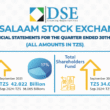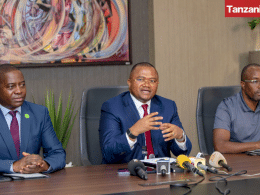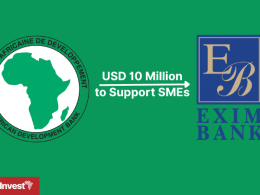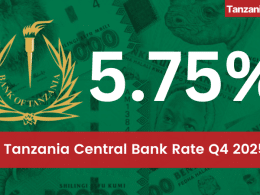TanzaniaInvest spoke with Ibrahim Mwangalaba, Managing Director of Maendeleo Bank, the first bank to list on Dar Es Salaam Stock Exchange – Enterprise Growth Market. TanzaniaInvest and Mr. Mwangalaba discussed the Maendeleo’s strategy and vision, the current state and future of the banking sector in Tanzania, and the role of credit bureaus in fostering financial inclusion.
TanzaniaInvest: Maendeleo Bank is the first bank to list on the new Dar es Salaam Stock Exchange alternative market. What’s the story and strategy behind it?
Ibrahim Mwangalaba: Maendeleo Bank Plc started as a result of the strategically decision made during the Annual General Meeting of the Evangelical Lutheran Church of Tanzania – Eastern and Coastal Diocese in 2008 where it was decided to establish a regional bank and in September 2013 the bank was established.
The broader goal of the bank is to provide banking services to all other unbanked and financially disadvantaged people in the country.
In order to raise enough capital, the bank was approved by Tanzanian Capital Market and Securities Authority and authorized to sale shares to the public through Enterprise Growth Market (EGM).
The EGM allows qualifying small entrepreneurs and companies to get startup capital by going through the Dar es Salaam Stock Exchange.
Maendeleo Bank became the first product of EGM after putting the 8.0mn shares at Tshs. 500 each on IPO with a green-shoe option.
During the IPO our prospective investors read the investment proposal and found the company to be diverse and with a very bright future. Our aim was to collect Tshs. 4 billion in shares, but we collected Tshs.4.5 billion.
TI: On the day of initial listing Maendeleo’s share appreciated 20%. Were you expecting that?
IM: Yes, because at that time the IPO was about to close, we were getting inquiries from people all over Tanzania- even abroad- regarding how they could buy Maendeleo Bank shares.{xtypo_quote_right}After closing the IPO, so many people came to buy shares that we had to turn them away and advise them to wait for the official listing{/xtypo_quote_right}The day after closing the IPO, so many people came to buy shares that we had to turn them away and advise them to wait for the official listing where they will be able to buy shares from the market, especially, authorized security brokers. In a short amount of time, even more people wanted to buy shares.
TI: What is Maendeleo’s vision and development strategy? What’s your core market?
IM: Our vision is to be the best bank in Tanzania, which is customer need driven with competitive returns to the shareholders. We are the 51st bank to open in the country and we have seen all the gaps available to fill in.
Only about 13% of Tanzanians access financial services through banks.
Our aim is to recruit people who are disadvantaged in the current financial sector and we are attracting people from all ends, low and high income earners, to use our services.{xtypo_quote_left}Our vision is to be the best bank in Tanzania [and] recruit people who are disadvantaged in the current financial sector{/xtypo_quote_left}.
When you look at Tanzania, the biggest challenge to entrepreneurs here from a lending aspect is the availability of collaterals to access credit.
You may find someone with great business ideas, but they don’t have any collateral hence not eligible for loans.
So we found that we have to assist these people, and we are working with them and giving them opportunities to grow their businesses.
After a year or two you can see them growing from a micro-business to a small or medium enterprise.
TI: Among the challenges towards greater financial inclusion is that banks primarily operate in Dar es Salaam, while most of Tanzania’s population is in rural areas. How do you plan to access these people?
IM: This is true, but to add to it, the people living and banking in Dar es Salaam are mostly those who work in the city center.
There are about 5 million people in the whole city, but only a small percentage is accessing banking services.
Maendeleo Bank considered these to be important people to reach because when they are given proper training and guidance they can be productive players in the banking services.{xtypo_quote_right}First and foremost Maendeleo Bank aims to increase its customer base in Dar es Salaam{/xtypo_quote_right}So first and foremost Maendeleo Bank aims to increase its customer base in Dar es Salaam, though we will expand into the other regions and we plan to open at least one branch per year around the country.
TI: What are Maendeleo Bank’s biggest challenges?
IM: At present we only have one branch, so I understand our biggest challenge is the network.
There are a lot of people who want to open accounts with us but for the moment we are only in Dar es Salaam.
The network challenge will be resolved soon when we will launch mobile banking and agency banking which are expected to be launched in 2014 after obtaining the necessary approvals from Central Bank.
Another challenge is the level of capital we currently have. We have been receiving loan applications that are bigger than what we are able to give. We have to abide by Central Banking requirements on single borrower’s limit, of which we can only lend up to 25% of our core capital.
The other challenge is that the banking industry is very competitive so we have to be creative with making sure customers really understand who we are, which means we have to invest in innovations, ICT and advertisement, which are up there.
TI: With mobile money transfer made available by mobile network operators, how relevant is it to for banks to develop traditional branches network?
IM: When you compare mobile money transfer to a traditional account, you can be 100% sure with money you kept in a bank account because its more regulated, highly secured in terms of documentations and identification and even if a customer dies, the bank will be able to pass on his/her money on to a beneficiary. {xtypo_quote_left}When you compare mobile money transfer to a traditional account, you can be 100% sure with money you kept in a bank account because its more regulated{/xtypo_quote_left}
Traditional banking does not penetrate the country in the way mobile money transfer does, so now traditional banks have been compelled to join mobile companies.
Mobile network companies are also able to build their reputation by joining traditional banks because they become more respected and secure.
I believe mobile money transfers have been a good challenge for banks to increase our flexibility and make us think faster.
It has also decreased a lot of the bureaucratic processes that are part of the reason why most people are not able to access banking services.
TI: Agency banking was recently introduced in Tanzania. What is your view on this?
IM: We are also interested in reaching rural customers through agency banking as it is more cost effective than maintaining a full bank branch to reach people all over the country.
We appreciate Central Bank by putting in place agency banking policy where banks will be guided by the policy accordingly.
TI: Two international credit bureaus have just entered the Tanzanian market? Do you think this will create an environment for banks to increase lending?
IM: Banks have been waiting for this initiative for a long time, but there is hesitation by banks to provide detailed information of their loan portfolio thinking that their information may be used/accessed by other competitors.
I believe this is a wrong perception because the bureaus are operating under a role of the country and they are supervised closely by the Bank of Tanzania (BOT).
Thanks to the BOT Governor for his efforts we see banks and corporate comply with bureaus as intended.
The bureaus will increase our ability to lend to good and qualified people.
Obvious banks don’t lend against collateral, they lend against business, so it’s critical that banks can access information on character, ability and other key information before they lend money to the borrowers.
Bureaus will help with sorting out the bad from the good by giving reliable information to banks.
TI: How do you see the future of Tanzania’s Banking sector?
IM: Only about 13% of Tanzanians are accessing banking services currently, so what of the other 87%? Still there is a room to grow banking business in the country and there is a room for more banks to come in and participate in boosting the economy of the country.
However, there is a likely hood of small banks to face a liquidity challenge which may force them to merge so that they join their hands to compete.{xtypo_quote_right}there is a room to grow banking business in the country and there is a room for more banks to come in{/xtypo_quote_right}
TI: What would you tell foreigners about Tanzania as a whole?
IM: Tanzania is a great and rich country, its economically sound and worth for investing.
We have gas and oil. We just need Tanzanians to take advantage of these resources and open doors to investors.
I trust that the country has a bright future if the government creates clear policies in unison with the foreign and Tanzanian banking sectors on how to manage these resources.










